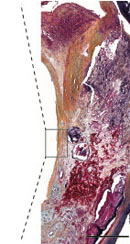The term atherosclerosis refers to a pathological process in which fat-rich deposits in the walls of major blood vessels, particularly at branch-points of the arterial tree, provoke a localized inflammatory reaction that becomes chronic. The resulting build-up of the atherosclerotic plaque restricts and may ultimately block blood flow, causing a heart attack or a stroke. Local inflammation is initiated by the activation of endothelial cells that make up the inner surface of the blood vessel, which in turn enables specialized immune cells called monocytes to adhere to them. Continuing recruitment of immune cells then promotes the formation of plaques. A team from the Institute for Cardiovascular Prevention at the LMU Medical Center, led by Andreas Schober, has now discovered that an enzyme called Dicer plays a central role in the activation of the endothelial cells. The researchers characterized the mechanism underlying the activation process and identified a new potential target for the therapy of atherosclerosis. The results of the study have been recently published in the journal “Nature Communications”. Further reading
http://www.uni-muenchen.de/forschung/news/2016/schober_microrna.html

